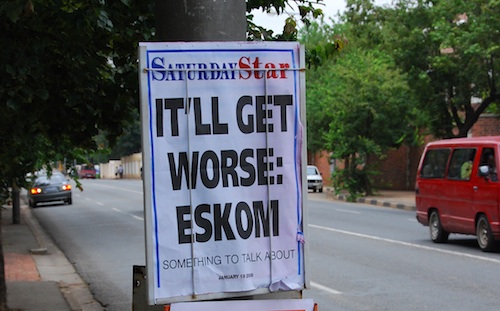South Africa
South Africa's poor to pay for dirty World Bank loan

By Patrick Bond, Durban
April 14, 2010 -- Just how dangerous is the World Bank and its neo-conservative president Robert Zoellick to South Africa and the global climate? Notwithstanding South Africa's existing US$75 billion foreign debt, on April 8 the bank added a $3.75 billion loan to South Africa's electricty utility Eskom for the primary purpose of building the world's fourth-largest coal-fired power plant, at Medupi. It will spew 25 million tons of the climate pollutant carbon dioxide into the air each year. [For more background go to http://links.org.au/node/1570.]
South Africa's finance minister Pravin Gordhan has repeatedly said that this is theWorld Bank's "first" post-apartheid loan, yet the bank's 1999 and 2008 Country Assistance Strategy documents show conclusively that Medupi is the 15th credit since 1994.
COSATU on the murder of Eugene Terre’Blanche: `an enemy of democracy, a racist and a fascist'
By Patrick Craven, COSATU national spokesperson
April 6, 2010 -- The Congress of South African Trade Unions (COSATU) condemns the brutal murder of Eugene Terre’Blanche on April 3, 2010, and sends its condolences to his family. Murder and violent assaults can never be condoned, even against your worst enemy. His killing however highlights the following issues:
COSATU will remember Terre’Blanche as an enemy of democracy, a racist and a fascist. His Nazi AWB tried to sabotage our transition to majority rule, when they forced their way into the World Trade Centre when our democracy was being negotiated, and when they invaded Bophuthatswana to defend a hated Bantustan system our people had rejected [in 1994].
He was also typical of the worst type of employer on South Africa’s farms. The reported circumstances of his murder speak volumes about the appalling state of labour relations on farms.
Conference of the Democratic Left: Unite to make another South Africa and world possible!

The following call was issued by the Conference of the Democratic Left, a left unity project in South Africa. It first appeared at the Conference of the Democratic Left web site.
* * *
A call to a national people’s conference against capitalism and for democratic left politics
A Call for united anti-capitalist action …
This is a call to come together in unity in a Conference Against Capitalism and for Democratic Left Politics.
1. The world is in crisis
Global capitalism threatens our world with disaster. If it is left to plunder the natural resources of our planet and pollute the atmosphere, the oceans and the soil, life itself will be under grave threat.
South Africa: Momentum against climate-destroying World Bank loan grows

By Patrick Bond, Durban
March 16, 2010 -- In an indication that the climate justice movement is broadening, deepening and going local, there is now intense opposition to a climate-destroying energy loan for South Africa. The campaign is led by community activists in black townships allied with environmentalists, trade unionists and international climate activists.
The World Bank is trying to lend nearly US$4 billion to the Johannesburg-based state-owned electricity utility Eskom, the world’s fourth-largest power company and Africa’s largest carbon emitter (with 40% of South Africa's total emissions). The loan is mainly for constructing the world-s fourth most CO2-intensive coal-fired power plant, Medupi, in the ecologically sensitive Waterberg area north of the capital of Pretoria.
The World Bank also aims to finance privatised power generation, notwithstanding the abject failure of public-private partnerships in South African infrastructure, including in electricity and water. More than 200 organisations have signed up in protest.
South Africa: "`Forgotten' Voices in the Present" book and documentary
A dream deferred from South African History Archive on Vimeo.
By the South African History Archive
"Forgotten" Voices in the Present: alternative, post-1994 oral histories from three poor communities in South Africa was authored by Dale McKinley and Ahmed Veriava and funded by Sephis and the Rosa Luxemburg Foundation. It is the fruition of two years worth of work and commitment to the goal of giving agency to those usually caught on the margins of South African society.Mozambique: ‘The war ended 17 years ago, but we are still poor’

Swaziland Democracy Campaign launched: `Justice denied anywhere is justice denied everywhere'

South Africa: 20 years after Mandela's release, class apartheid continues

By Patrick Bond
February 16, 2010 -- Recall that South Africa's President Jacob Zuma came to power last year as a result, mainly, of trade union and South African Communist Party mobilisations in 2006-08, culminating in the rude but welcome dismissal of president Thabo Mbeki.
And now, because he is unable to galvanise momentum for any sort of political project aside from survival [following another round of scandals surrounding his private life and dubious attitude towards women], Zuma appears to be drifting rightwards, towards the Afican National Congress' solid financial-support base of white capital and aspiring black entrepreneurs.
2010: Welcome to the upside-down world of South Africa

By Dale T. McKinley
January 11, 2010 -- SACIS -- Even if the meanings we give to measurements of time are most often overblown, there is something about the mark of a new decade. In the case of South Africa, 1990 marked the beginning of the end of the apartheid system, ushering in a period pregnant with new hopes, possibilities and dreams. When 2000 rolled around it heralded not only a once in a lifetime turn of a century but carried with it the delayed weight of the majority expectation of an age of progress and plenty. So what are our "inheritances" as we begin the new decade? Where do things stand? What is the mark of 2010?
